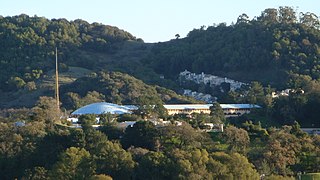
Marin County is a county located in the northwestern part of the San Francisco Bay Area of the U.S. state of California. As of the 2020 census, the population was 262,231. Its county seat and largest city is San Rafael. Marin County is across the Golden Gate Bridge from San Francisco, and is included in the San Francisco–Oakland–Berkeley, CA Metropolitan Statistical Area.
KOVR is a television station licensed to Stockton, California, United States, serving as the CBS outlet for the Sacramento area. It is owned and operated by the network's CBS News and Stations division alongside KMAX-TV, an independent station. The two stations share studios on KOVR Drive in West Sacramento; KOVR's transmitter is located in Walnut Grove, California.
KDKA-TV, also known as CBS Pittsburgh, is a television station in Pittsburgh, Pennsylvania, United States, serving as the market's CBS outlet. It is owned and operated by the network's CBS News and Stations division alongside Jeannette-licensed WPKD-TV, an independent station. The two stations share studios at the Gateway Center in Downtown Pittsburgh; KDKA-TV's transmitter is located in the city's Perry North neighborhood. KDKA-TV, along with sister station KYW-TV in Philadelphia, are the only CBS-affiliated television stations east of the Mississippi River with "K" call signs.

WMAQ-TV is a television station in Chicago, Illinois, United States, serving as the market's NBC outlet. It is owned and operated by the network's NBC Owned Television Stations division alongside Telemundo station WSNS-TV. The two stations share studios at the NBC Tower on North Columbus Drive in the city's Streeterville neighborhood and broadcast from the same transmitter atop the Willis Tower in the Chicago Loop.

WCAU is a television station in Philadelphia, Pennsylvania, United States, serving as the market's NBC outlet. It is owned and operated by the network's NBC Owned Television Stations division alongside Mount Laurel, New Jersey–licensed Telemundo outlet WWSI ; it is also sister to regional sports network NBC Sports Philadelphia.

KNSD is a television station in San Diego, California, United States, serving as the market's NBC outlet. It is owned and operated by the network's NBC Owned Television Stations division alongside Poway-licensed Telemundo station KUAN-LD. KNSD and KUAN-LD share studios on Granite Ridge Drive in the Serra Mesa section of San Diego; through a channel sharing agreement, the two stations transmit using KNSD's spectrum from an antenna southeast of Spring Valley.

KNTV, branded NBC Bay Area, is a television station licensed to San Jose, California, United States, serving as the NBC outlet for the San Francisco Bay Area. It is owned and operated by the network's NBC Owned Television Stations division alongside Telemundo outlet KSTS ; it is also sister to regional sports networks NBC Sports Bay Area and NBC Sports California. KNTV and KSTS share studios on North 1st Street in the North San Jose Innovation District; KNTV's transmitter is located on San Bruno Mountain, and two of its subchannels are also broadcast from the KSTS tower on Mount Allison.
KPIX-TV, also known as CBS Bay Area, is a television station licensed to San Francisco, California, United States, serving as the San Francisco Bay Area's CBS network outlet. It is owned and operated by the network's CBS News and Stations division alongside independent station KPYX, also licensed to San Francisco. The two stations share studios at Broadway and Battery Street, just north of San Francisco's Financial District; KPIX's transmitter is located atop Sutro Tower. In addition to KPYX, KPIX shares its building with formerly co-owned radio stations KCBS, KFRC-FM, KITS, KLLC, KRBQ and KZDG, although they use a different address number for Battery Street.

KTVU is a television station licensed to Oakland, California, United States, serving as the San Francisco Bay Area's Fox network outlet. It is owned and operated by the network's Fox Television Stations division alongside San Jose–licensed KICU-TV. The two stations share studios at Jack London Square in Oakland; KTVU's transmitter is located at Sutro Tower in San Francisco.
KRON-TV is a television station licensed to San Francisco, California, United States, serving as the San Francisco Bay Area's outlet for The CW. Owned and operated by The CW's majority owner, Nexstar Media Group, KRON-TV has studios on Front Street in the city's historic Northeast Waterfront, in the same building as ABC owned-and-operated station KGO-TV, channel 7. The transmitting antenna is located atop Sutro Tower in San Francisco.

KICU-TV, branded as KTVU Plus, is a television station licensed to San Jose, California, United States, serving the San Francisco Bay Area. It is owned and operated by Fox Television Stations alongside Oakland-licensed Fox outlet KTVU. The two stations share studios at Jack London Square in Oakland; KICU-TV's transmitter is located on Monument Peak in Milpitas. The station carries programming from Fox's secondary programming service, MyNetworkTV, as a graveyard slot offering.

KWHY-TV is a Spanish-language independent television station in Los Angeles, California, United States. It is owned by Meruelo Broadcasting alongside Garden Grove–licensed KBEH ; the two stations share RF channel 4 under a channel sharing agreement. KWHY and KBEH share studios on West Pico Boulevard in the Mid-City section of Los Angeles and transmitter facilities atop Mount Wilson.

KOFY-TV is a television station licensed to San Francisco, California, United States, serving the San Francisco Bay Area as an affiliate of Merit Street. It is owned by CNZ Communications, LLC, alongside Class A station KCNZ-CD and low-power station KQRM-LD. The three stations share transmitter facilities atop San Bruno Mountain. KOFY-TV's studios were previously located on Marin Street in the Bayview–Hunters Point neighborhood of San Francisco until 2018; the station has since maintained space at KGO-TV's studios north of the city's Financial District.

KSTS is a television station licensed to San Jose, California, United States, serving as the San Francisco Bay Area outlet for the Spanish-language network Telemundo. It is owned and operated by NBCUniversal's Telemundo Station Group alongside NBC outlet KNTV ; it is also sister to regional sports networks NBC Sports Bay Area and NBC Sports California. KSTS and KNTV share studios on North 1st Street in the North San Jose Innovation District; KSTS's transmitter is located on Mount Allison, and two of its subchannels are also broadcast from the KNTV tower on San Bruno Mountain.

KFRC-FM is a commercial radio station in San Francisco, California, serving the San Francisco Bay Area. It currently simulcasts sister station KCBS, which carries an all-news format. The station transmits its signal from Mount Beacon atop the Marin Headlands above Sausalito, California, while studios were shared with formerly co-owned CBS O&O station KPIX-TV in downtown San Francisco.
KMVQ-FM is a commercial radio station licensed to San Francisco, California. It is owned by Salt Lake City–based Bonneville International, and broadcasts a contemporary hit radio format branded 99.7 Now. KMVQ-FM's studios are located in Daly City.

The Marin Independent Journal is the main newspaper of Marin County, California. The paper is owned by California Newspapers Partnership, which is in turn mostly owned by MediaNews Group.
Gary Weis is an American filmmaker.
Rita Abrams is an American songwriter, performer and writer. Her song "Mill Valley", recorded with children at the school where she was teaching, was released under the name Miss Abrams and the Strawberry Point Fourth Grade Class in 1970, becoming a Billboard Hot 100 and Easy Listening hit and being nominated for a Grammy. In 1980, she won an Emmy for the music for I Want It All Now!, an NBC documentary about life in Marin County, California.

KEYT-TV is a television station licensed to Santa Barbara, California, United States, serving the Central Coast of California as an affiliate of ABC, CBS, and MyNetworkTV. It is owned by the News-Press & Gazette Company (NPG) alongside San Luis Obispo–licensed low-power, Class A Fox affiliate KKFX-CD ; NPG also provides certain services to Santa Maria–licensed Telemundo affiliate KCOY-TV through a shared services agreement (SSA) with VistaWest Media, LLC. KEYT-TV's studios are located on Miramonte Drive on TV Hill, overlooking downtown Santa Barbara; KCOY-TV and KKFX-CD share separate facilities at West McCoy Lane and Skyway Drive in Santa Maria north of Santa Maria Public Airport. KEYT-TV's transmitter is located atop Broadcast Peak, between Santa Barbara and Santa Ynez in the Santa Ynez Mountains.













